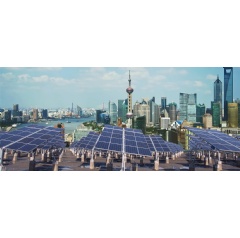
Walmart announced today that its suppliers have reported avoiding 3.46 million metric tons (CO2e) of greenhouse gas emissions in the Chinese value chain as part of Project Gigaton China. This is equivalent to the emissions associated with the average annual electricity consumption of over 3 million Chinese households and marks a strong year one result for Project Gigaton China, which Walmart launched one year ago with the aim of preventing 50 million metric tons of emissions in the Chinese value chain alone. It is part of Walmart’s global Project Gigaton commitment to work with its suppliers to cut 1 billion metric tons (CO2e) – a gigaton – of greenhouse gas emissions from the global value chain of upstream suppliers and downstream consumers by 2030.“At Walmart, we believe in the power of companies to work together to create a more sustainable future. China is a major and integral part of the global retail supply chain, and we are committed to supporting our suppliers to enhance their environmental and economic progress. As Project Gigaton gains momentum, it will not only have a substantial impact on sustainability in China, but will also help our suppliers improve their competitiveness and deliver more innovative products to consumers in China and to export markets worldwide.”-Dirk Van den Berghe, executive VP and regional CEO of Walmart Canada & AsiaWalmart China has been a key driver of Project Gigaton worldwide. With the effort of Walmart’s teams in Shanghai and Shenzhen, and their colleagues around the world, hundreds of Chinese suppliers and others operating in China have already committed to the program. Among these is China’s Technical Consumer Products Inc (TCP).Supplying lightbulbs internationally and to more than 400 Walmart stores in China, TCP previously worked with Walmart on sustainability as part of the Walmart Factory Energy Efficiency program, making energy efficient process improvements at its Jiangsu plant. TCP’s focus on energy efficiency became more ambitious when it joined Project Gigaton with a commitment to save millions of tons of emissions through product innovations, such as new energy-efficient bulbs, in addition to continuing its factory energy-efficiency initiatives.“We are proud to be contributing to sustainability for our customers in China as part of Project Gigaton,” said Ellis Yan, CEO, Technical Consumer Products. “With the support of Walmart, we have cut our greenhouse gas emissions through factory efficiency. What’s more, we’re committed to more emission-saving product innovations like our redesigned light bulbs, which consume 36 percent less energy than their predecessors, helping customers reduce emissions and save money.”To support suppliers in China and around the world to join Project Gigaton and reduce emissions, Walmart has created a digital resource center with tools, case studies, and program resources: www.walmartsustainabilityhub.com. Materials are available in Mandarin, English and French.Walmart partners with HSBC to support green finance
Walmart is also collaborating with HSBC in its Sustainable Supply Chain Finance (“SSCF”) program, which launched today. SSCF allows suppliers that demonstrate progress in The Sustainability Index, powered by The Sustainability Consortium’s measurement and reporting system, or through Project Gigaton to apply for improved financing from HSBC. The global collaboration between HSBC and Walmart demonstrates both companies’ leadership in shaping the transition to a lower emissions world.“Time and time again, Walmart has seen how sustainability sparks operational and innovation benefits for our suppliers. We believe financing like this will encourage suppliers to move up the sustainability curve and become even more efficient and successful.”– Ash Eisa, Senior Vice President for Walmart Global SourcingNatalie Blyth, Global Head of Trade and Receivables Finance, HSBC, comments: “We are proud to join forces with Walmart, the world’s largest retailer and a company that shares our mission to build a more sustainable future. In many industries it is a company’s supply chain – rather than the company itself – that is responsible for most of the environmental impact and therefore offers the greatest potential for sustainability improvements.”Investing in sustainability
Alongside Project Gigaton, Walmart has also committed to reducing the carbon intensity of its own operations in China through initiatives such as increasing the percentage of its electricity supplied by renewables and upgrading existing equipment such as lighting, refrigeration and other equipment in its stores. Walmart opened 33 new stores in China last year, including 4 Sam’s Clubs and a new supermarket format, all incorporating energy-saving features. Four Walmart stores earned the National Certificate of Green Store granted by China’s Ministry of Commerce during the year, and Walmart also installed new rooftop solar PV systems at two locations.To receive more information on Walmart’s sustainability efforts, please read more in the Walmart Global Responsibility Report.About Walmart
Walmart Inc. (NYSE: WMT) helps people around the world save money and live better – anytime and anywhere – in retail stores, online, and through their mobile devices. Each week, over 275 million customers and members visit our more than 11,300 stores under 58 banners in 27 countries and eCommerce websites. With fiscal year 2019 revenue of $514.4 billion, Walmart employs over 2.2 million associates worldwide. Walmart continues to be a leader in sustainability, corporate philanthropy and employment opportunity. Additional information about Walmart can be found by visiting http://corporate.walmart.com, on Facebook at http://facebook.com/walmart and on Twitter at http://twitter.com/walmart.

